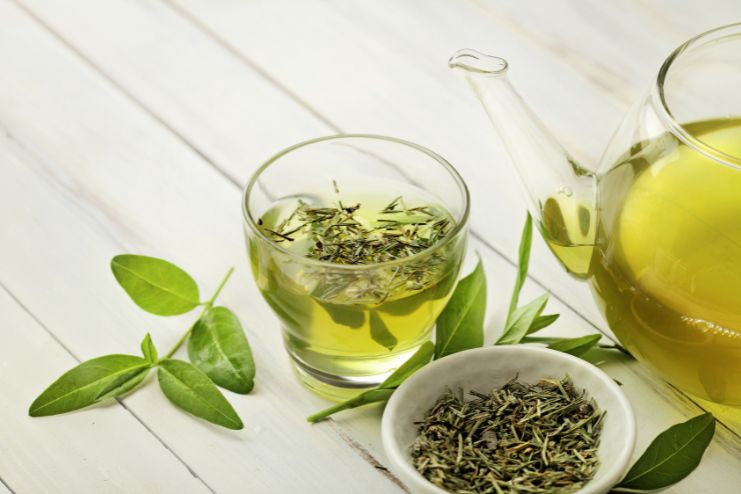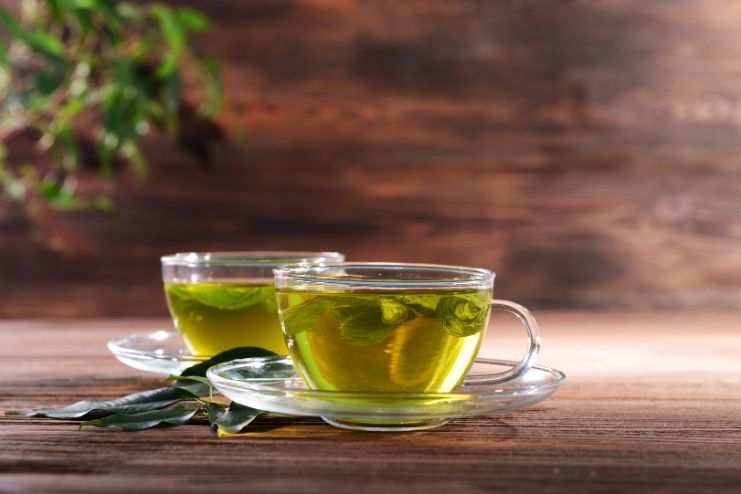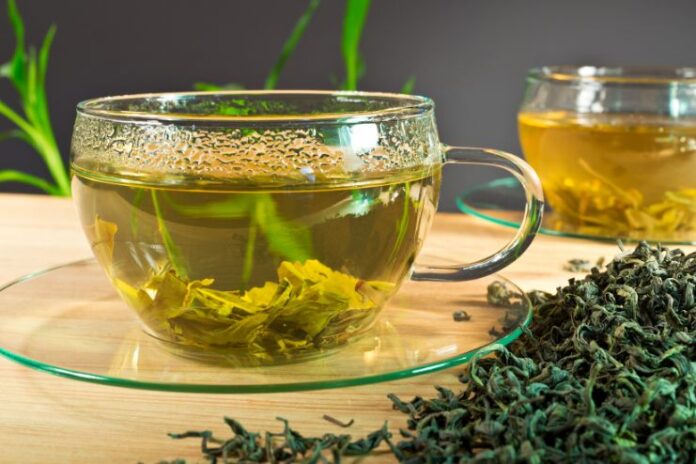Are you drinking green tea at the wrong time of day? While many people praise green tea for its potent health benefits—boosting metabolism, enhancing brain function, and improving overall well-being—few realize that timing is key to maximizing its effects. Inappropriate timing of green tea consumption may result in problems such as poor nutrition absorption, acidity, or disturbed sleep.
What time of day is ideal for drinking green tea? The timing of your tea consumption can significantly impact your weight loss, energy levels, and digestive health. We’ll explore the science behind green tea timing in this article, including when to drink it for particular health benefits and when to avoid it. By the end, you’ll understand how to incorporate green tea into your daily routine for optimal benefits. Let’s get started!
Read More: Coffee vs. Green Tea – Which One Actually Boosts Metabolism More?
Health Benefits Of Green Tea

1. Decrease in Weight
According to a 2021 review, green tea and the catechin epigallocatechin gallate (EGCG) may aid in weight loss for obese individuals.
An additional meta-analysis of various methods by which tea polyphenols caused weight reduction revealed that catechins and caffeine worked together to create weight loss benefits rather than caffeine alone.
However, green tea consumption’s effect on weight loss is not expected to be clinically significant. The majority of research using green tea extracts with exceptionally high catechin concentrations revealed slight alterations in metabolism.
2. Might Encourage Calmness
L-theanine, an amino acid found in green tea, calms by raising mood-enhancing brain chemicals like serotonin, dopamine, and GABA.
3. Could Lower the Risk of Diabetes
Some studies have concluded that a lifetime of consistent consumption of polyphenols from foods like green tea may be just as effective as medication in lowering the risk of diabetes due to the ability of tea polyphenols to delay the gut’s absorption of glucose (sugar) and inhibit digestive enzymes like lactase; however, more research is required.
4. Reduce your Cholesterol
According to a 2020 review, drinking green tea can considerably reduce total cholesterol and low-density lipoprotein cholesterol in moderately overweight or obese people.
The authors point out that further study and significantly longer studies with a broader range of demographics are necessary.
5. Might Enhance Intestinal Health
The polyphenols found in tea and other plant components travel unabsorbed to the large intestine, where gut bacteria break them down. They do this by giving the good bacteria that live in this area of the gut a food source, enabling them to grow and diversify while also enhancing gut function and altering the immune system.
Read More: New Study Emphasizes The Potent Benefits of Green Tea On Cognitive Functions
6. Reduces Stress and Anxiety
L-theanine, an amino acid that can reduce tension and anxiety, is found in one of the highest concentrations in green tea. According to one study, those who took 200 mg of L-theanine supplements daily for four weeks experienced improvements in their sleep, anxiety, and depression compared to those who took a placebo, which is an inactive pill. Remember that this is much higher than the 8–30 milligrams in a cup of green tea.
7. Protects Against Cognitive Deterioration
According to some research, green tea may offer some protection against neurodegenerative illnesses, including Parkinson’s and Alzheimer’s. Green tea contains many antioxidants, which aid in preventing cell damage, which increases the likelihood of developing certain illnesses.
Remember that more human clinical research is required to better understand how green tea affects neurodegenerative illnesses like Alzheimer’s.
8. Potential Memory Improvement
Research suggests that green tea’s L-theanine component may help with memory. In one study, 12 healthy volunteers’ working memory was enhanced by green tea extract.
Working memory is a type of short-term memory that is crucial for understanding, organizing, and solving problems. The results are inconclusive because the study only included a limited sample of participants. The effects of green tea on memory require further investigation.
Best Time to Have Green Tea

1. In the Morning
Many people decide to have a calming cup of green tea first thing in the morning to improve their attention and concentration.
Caffeine, a stimulant proven to improve alertness and focus, contributes to the drink’s mind-sharpening qualities.
L-theanine, an amino acid which have relaxing properties, is also present in green tea, in contrast to coffee and other kind of caffeinated beverages.
Read More: Which is Best : White Tea vs Green Tea
2. Drink in Between Meals
To optimize nutritional intake and iron absorption, you can have a cup of green tea between meals, for instance, two hours before or after. Do not consume green tea with food if you suffer from anemia.
3. Around Physical Activity
Research shows that green tea consumption may be advantageous before working out.
In a study involving 12 men, eating green tea extract prior to exercise enhanced fat burning by 17% compared to a placebo.
In another study, researchers found that 13 women burned more fat during exercise when they drank three servings of green tea the day before and another two hours beforehand.
4. Two Hours Before Going to Bed
Green tea should not be consumed before bed because the caffeine can cause sleep disturbances. It contains L-theanine, a amino acid that improves focus and wakefulness.
Two hours before bed is the ideal time to drink green tea because this is when metabolism is at its lowest, and it can speed it up.
Read More: Switching from Coffee to Tea – 15 Benefits You Didn’t Know Of
Worst Times to Drink Green Tea

1. Before Going to Bed
Drinking green tea immediately before bed can backfire for people who want to get a good night’s sleep, especially if they are caffeine-sensitive. Green tea has significantly less caffeine than coffee, but it’s enough to interfere with sleep cycles and make it harder to fall or stay asleep all night.
Adenosine is a neurotransmitter that promotes relaxation and drowsiness, whereas caffeine is a stimulant that can counteract its effects. Consuming green tea right before bed may cause people to feel more awake and make it difficult to relax and fall asleep.
2. On an Empty Stomach
Some people may experience nausea or an upset stomach if they drink green tea on an empty stomach, especially first thing in the morning. It happens because green tea contains polyphenols, which researchers have shown to increase the stomach’s gastric acid production.
Although gastric acid is necessary for healthy digestion, too much of it, particularly when the stomach is empty, can exacerbate digestive problems like acid reflux or gastritis in vulnerable people. Green tea should be consumed with or after meals to reduce the risk of digestive pain for people prone to gastritis or acid reflux.
3. Shortly after Taking Medication
If you regularly take your medications with a cup of green tea, you should stop. Green tea might be dangerous if consumed with or immediately after taking medication. It may react with the molecules in your medications, causing acidity. As a result, taking your medications with only plain water is always advised.
Read More: Ginger Tea For Weight Loss – Does It Work?
4. Soon After Meals
Green tea contains abundant tannins and polyphenolic chemicals with an astringent flavor and antioxidant qualities. However, tannins can also form insoluble compounds with dietary iron in the digestive system, preventing the absorption of iron.
Drinking green tea right after eating iron-rich foods like spinach, lentils, or red meat can significantly interfere with iron absorption. Green tea use soon after meals high in iron might reduce the bioavailability of dietary iron, which may eventually result in inadequacies.
5. While Nursing or Pregnant
Drinking green tea or other caffeinated beverages in excess while nursing can also negatively affect the baby’s health. Caffeine’s absorption into breast milk can result in increased irritability, disturbed sleep, and altered eating habits in breastfed infants.
Nursing moms are advised to limit their caffeine intake and pay attention to their consumption of caffeinated beverages, such as green tea, to support their infants’ health and well-being.
Read More: 12 Lesser Known Benefits Of Tulsi Tea
Conclusion
What time of day is ideal for drinking green tea, then? Your objectives will determine everything! Drink it after breakfast in the middle of the morning if you need an energy boost to stay energized without experiencing stomach pain. You can also enjoy a cup two hours before bed, when your metabolism slows down, and green tea can help gently stimulate it.
Want to improve your weight reduction efforts? Have a cup half an hour before working out to boost fat burning. Do you wish to avoid the lunchtime slump? Drinking green tea in the afternoon helps you stay alert and attentive. Additionally, if you want to unwind without disrupting your sleep, use a decaffeinated version at two hours before bedtime.
It’s all about what suits you best. Caffeine sensitivity, lifestyle, and your physique all play a part. Try out various timings and observe how your body reacts. Finding what works best for you is more important than strictly adhering to a green tea timetable. Thus, prepare your tea, take a conscious sip, and allow nature’s remedy to improve your health as you see fit!
-
Feb 2018Written by Kavita R
-
May 2025Edited by Ankita
References
- https://www.medicalnewstoday.com/articles/269538#stroke-risk
- https://www.bbcgoodfood.com/health/nutrition/health-benefits-green-tea
- https://www.health.com/nutrition/benefits-green-tea
- https://www.healthline.com/nutrition/best-time-to-drink-green-tea#best-times
- https://en.tempo.co/read/920948/4-best-times-to-drink-green-tea
- https://www.healthshots.com/healthy-eating/nutrition/these-are-the-4-absolute-worst-times-to-have-green-tea-in-a-day/
In this Article

















